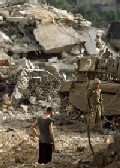
I walked down the stairs of the appartment building, walked down the hill, crossed the road and stepped into the office. ‘Di, tell me, are these confirmed reports?’ I asked her. ‘Yes, these are consistent accounts, confirmed and verified.’
I’m surprised how I can listen to these horror-stories and stay calm. Eyewitnesses have told us that Israeli forces have continued moving bodies outside Jenin refugee camp. They saw an Israeli truck with bodies inside plastic bags.
The bodies were taken out of the truck and put in holes dug by bulldozers. Later, they saw bulldozers coming back to the location, which is outside Jenin refugee camp, taking out an estimated thirty bodies from the holes and loading the bodies back on the truck.
The bodies were then taken in the direction of the ‘Green Line’, the demarcation line between Israel and the Occupied Palestinian Territories.
We hear more reports of residents who have seen bulldozers demolishing homes and shelters in which there were still people, including women and children. They also saw bodies, including bodies of women and children, in the rubble of demolished homes. They also told us that they have seen bulldozers driving back and forward over bodies in Jenin refugee camp.
Others saw a family trying to flee their home, that was about to be demolished by Israeli bulldozers. When the family, including a woman carrying her child, stepped outside their home in Jenin refugee camp, they were fired upon from an Apache helicopter with heavy machinegunfire.
‘We also spoke with detainees,’ says Di. ‘They have experienced similar treatment, including hooding, prolonged periods of being held in painful positions, beatings and painful use of shackles. They had to sit outside on the ground, with their heads between their legs, while being blindfolded and handcuffed. Most of them were beaten with rifle butts and kicked with army boots. They were prevented from access to food, water, and blankets. Some detainees, who asked for water, were given urine instead, or beaten.’
The stories make me think of cases in Rwanda, former Yugoslavia, Sabra and Shatila, Chile, and other cases in which universal jurisdiction and war crimes are being prosecuted.
Yes, indeed, this is ethnic cleansing. That is the term used to describe a process of cleansing an area or territory of a particular group. The creation of a buffer zones, that is how the world prefers to term this type of ethnic cleansing. Although there is no legal definition of ethnic cleansing, the cleansing campaign carried out in former Yugoslavia as documented by the International Committee of the Red Cross filtered some elements:
- Uprooting by military attacks: Villages inhabited by other ethnic groups are indiscriminately bombed or subjected to other military attacks to make the civilians flee;
- Arbitrary arrests and detention/unfair trials: Men often rounded up and arrested as ‘terrorists’ or potential combatants without proper arrest or other fair process and trial protections;
- Attacks on women, children, the elderly: Women were often sent together with children and the elderly in organised transports or on their own to areas controlled by the perpetrators;
- Property and home destruction: Property and homes are systematically destroyed to preclude all hope of the ousted families from returning to their original homes. In former Yugoslavia homes were systematically burned or razed to the ground;
- Harassment to make life so unbearable that people leave: In other cases, persons are subjected to non-violent harassment until they see no future in their home region and leave.
And what does the Fourth Geneva Convention say about this?
- Article 27: ‘Protected persons are entitled, in all circumstances, to respect for their persons, their honour, their family rights, their religious convictions and practices, and their manners and customs. They shall at all times be humanely treated, and shall be protected especially against all acts of violence or threats thereof…’
- Article 32: ‘[the occupying power is]…prohibited from taking any measure of such a character as to cause the physical suffering or extermination of protected persons in their hands. This prohibition applies not only to murder, torture, corporal punishment, mutilation and medical or scientific experiments not necessitated by the medical treatment of a protected person but also to any other measures of brutality whether applied by civilian or military agents.’
- Article 33: ‘No protected person may be punished for an offence he or she has not personally committed. Collective penalties and likewise all measures of intimidation or of [state] terrorism are prohibited…Reprisals against protected persons and their property are prohibited.’
- Articles 35-43
- Article 49: ‘Individual or mass forcible transfers, as well as deportations of protected persons from occupied territory to the territory of the Occupying Power or to that of any other country, occupied or not, are prohibited, regardless of their motive.’
- Article 52: ‘No contract, agreement or regulation shall impair the right of any worker, whether voluntary or not and wherever he may be, to apply to the representatives of the Protecting Power in order to request the said Power’s intervention. All measures aiming at creating unemployment or at restricting the opportunities offered to workers in an occupied territory, in order to induce them to work for the Occupying Power, are prohibited.’
- Article 53: ‘Any destruction by the Occupying Power of real or personal property belonging individually or collectively to private persons, or to the State, or to other public authorities, or to social or cooperative organizations, is prohibited, except where such destruction is rendered absolutely necessary by military operations.’
PHOTO: Jenin refugee camp; AP Photo/Lefteris Pitarakis


